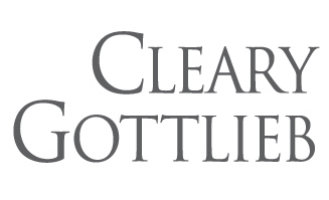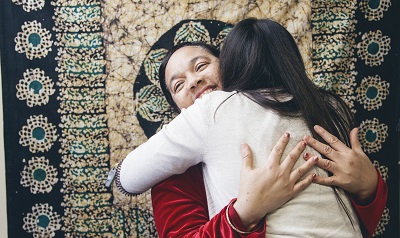At this year’s Above & Beyond Pro Bono Achievement Awards and Benefit, Sanctuary for Families is honoring a team of Cleary Gottlieb Steen & Hamilton attorneys for their pro bono work on behalf of Sanctuary client “Ms. G.”
At this year’s Above & Beyond Pro Bono Achievement Awards and Benefit, Sanctuary for Families is honoring a team of Cleary Gottlieb attorneys for their pro bono work on behalf of Sanctuary client “Ms. G,” a survivor of female genital mutilation, sexual violence, and torture. The Cleary Gottlieb team of associates S. Ellie Norton, Clayton Simmons, Jessica Thompson, and Marion de Meslon have championed Ms. G’s asylum claim throughout three years of immigration proceedings to prevent Ms. G from being deported to her persecutors in Burkina Faso.
Finding Sanctuary
Ms. G was living in a crisis domestic violence shelter when she first met Ellie, Clay, Jessica, and Marion. She suffered from repeated infections and hospitalizations caused by the female genital mutilation (FGM) she was forced to undergo as a young child. She had also been kidnapped, tortured, and raped by political groups in her home country of Burkina Faso.
After fleeing to the United States, Ms. G suffered further physical, sexual, and emotional abuse by her husband. Undocumented and unable speak or understand English, Ms. G. understandably felt scared and alone. Without friends or family members to help her, she turned to her doctors who referred her to Sanctuary for Families. Sanctuary helped Ms. G find shelter and connected her to her pro bono team at Cleary Gottlieb for legal representation.
Certain that Ms. G’s life would be in danger if she were forced to return to Burkina Faso, the Cleary Gottlieb pro bono team quickly filed an affirmative application for asylum on Ms. G’s behalf.
The team advocated that Ms. G must be granted asylum in the United States because she had endured severe persecution and horrific human rights violations in the past and would face further persecution if returned to Burkina Faso, due to political violence and the high rates of FGM and gender violence against women in Ms. G’s ethnic group in Burkina Faso.
Claiming asylum
Ms. G presented a strong claim to asylum at her asylum office interview in 2014, but to the pro bono team’s surprise, the asylum officer rejected her application merely because it lacked a copy of her marriage certificate, which was in the possession of her abusive husband. Ellie explained:
“The only copy of Ms. G’s marriage certificate available in the United States was in the hands of her abusive husband, who refused to turn it over to us.”
Although the pro bono team attempted to procure another copy of Ms. G’s marriage certificate directly from Burkina Faso, it unfortunately did not arrive in time for the interview and the asylum officer was unwilling to wait. As a result, Ms. G was directly placed into deportation proceedings.
Disappointed but undeterred, the Cleary Gottlieb associates began preparing Ms. G to present her asylum claim before an immigration judge. According to Clay:
“We tried to be sensitive to Ms. G’s emotions and give her as much support as possible because we knew that having to relive the traumatic experiences of her past by telling her story yet again would be very challenging for her.”
Ms. G and the pro bono team were confident and ready to argue the merits of her case at her first scheduled immigration court hearing, but unfortunately the hearing was adjourned.
Moving forward
The merits hearing finally took place in 2016, nearly two years after her asylum office interview. At Ms. G’s merits hearing, opposing counsel made the surprising decision to defer to the judge for a decision without requiring Ms. G to testify.
The judge remarked that the team’s presentation of Ms. G’s asylum application was so strong he would grant it on the existing record alone, pending routine security clearances. The team is hopeful that Ms. G will finally be granted asylum at her next hearing later this year.
Sayoni Maitra, the Immigration Intervention Project Staff Attorney at Sanctuary for Families who worked with the Cleary Gottlieb pro bono team, shared that Ellie, Clay, Jessica, and Marion are being recognized because of the “great compassion, encouragement, and emotional support” that they provided to Ms. G “[t]hrough a long and arduous immigration process.” Sayoni added that “the team’s outstanding preparation of Ms. G’s asylum application was so impressive that even opposing counsel agreed to forego testimony, sparing Ms. G the trauma of retelling her painful past in court.”
When asked to reflect on the most meaningful part of their experience as Ms. G’s pro bono attorneys, the Cleary Gottlieb team marveled at Ms. G’s tremendous strength and growth as an individual. “Ms. G has remained resilient, calm, and composed throughout an extraordinarily difficult process,” said Jessica.
“She graduated from college in Burkina Faso and has since been taking additional classes in the United States to learn English and develop a career here. With counseling from Sanctuary for Families, Ms. G has gotten back on her feet. Seeing her remarkable progress over the years has been so rewarding.”
When asked to reflect on her experience working with the Cleary Gottlieb pro bono team, Ms. G said “I want to thank Clayton, Ellie, Jessica, and Marion for the work they did for my case. They were helpful in many ways in my life in the United States and I will always be grateful to them.”
—
Join us at our Above & Beyond celebration on October 19, 2016 at the Highline Ballroom as we honor Cleary Gottlieb Steen & Hamilton’s outstanding pro bono work. Learn more about the event here. If you can’t join us, but would like to support Sanctuary for Family’s work, please consider making an Above & Beyond donation here.
Erin Meyer is the Pro Bono Manager at Proskauer Rose LLP and was formerly a senior associate at Hogan Lovells US LLP. She is also a member of Sanctuary’s Pro Bono Council and Co-Chair of this year’s Above & Beyond event.


